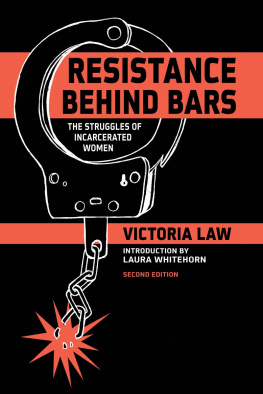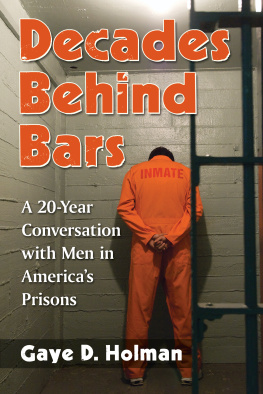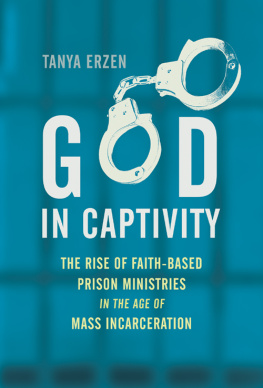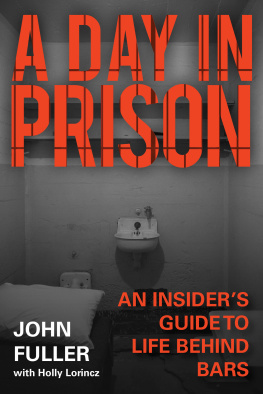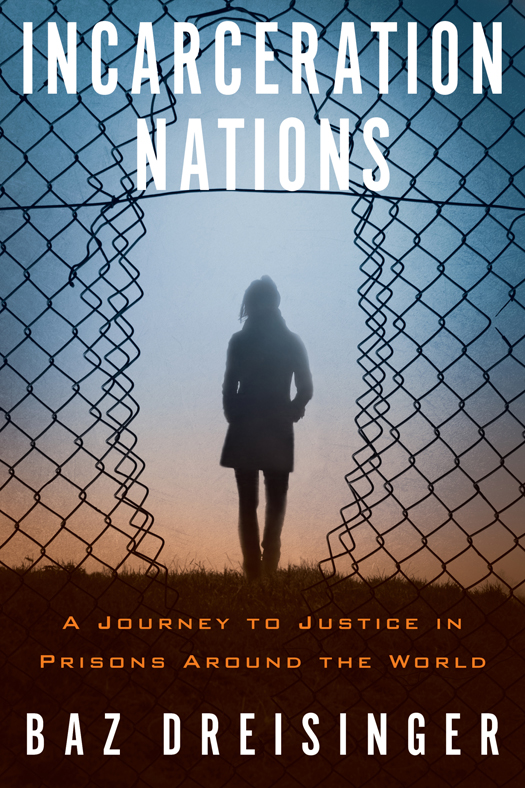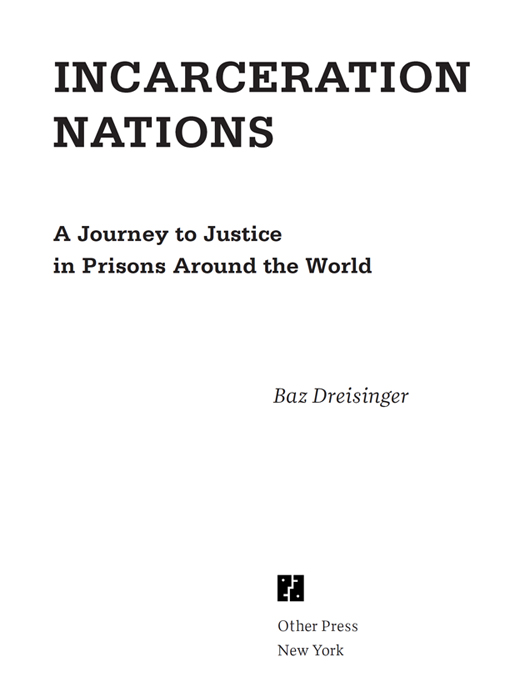PRAISE FOR INCARCERATION NATIONS
Offering historical investigation and myriad facts, and complementing that research with personal experiences and stories of human beings, Incarceration Nations captures the reader into more inquiry about this vast and critical subject. This is a great read for students of criminal justice, as well as citizens of the world.
DEBBIE MUKAMAL, Executive Director, Stanford Criminal Justice Center, Stanford Law School
[Incarceration Nations] is a vital workpart memoir, part scholarly excavationthat manages to inspire even as it chronicles some of the worlds most horrific places. Dreisingers long history of work with the currently and formerly incarcerated is the perfect background and material for weaving an account that asks all of the right questions, setting us on a path while acknowledging that answers are really just the ground for asking anew.
GINA DENT, Associate Professor, Feminist Studies, University of California, Santa Cruz
Through trenchant and deeply arresting prose, Professor Dreisinger places a microscope on the now global phenomenon of American-style incarceration, forcing us to confront the collectively authored catastrophes wed rather look away from. Through it all, Dreisinger places unflinching emphasis on prisons greatest offense: the destruction of human life.
GLENN E. MARTIN, Founder and President, JustLeadershipUSA
If you are asking yourself, How do we end the dehumanizing impact of prisons? How do we abolish, reform, or educate our way out of this twenty-first-century barbarism deceptively dubbed criminal justice? We definitely cant do it without listening to those who continue to be kidnapped from our communities around the country and caged. But what if we take it a step further and give a critical look and listen to folks behind bars the world over? What can we learn about our own humanityor lack thereoffrom a global dialogue with Incarceration Nations? Just turn the page
BRYONN BAIN, artist and Assistant Professor in Residence, UCLA, Founder of International Day of Action and Dialogue on Prison Activism
Also by Baz Dreisinger
Near Black: White-to-Black Passing in American Culture
Copyright 2016 by Baz Dreisinger
Production editor: Yvonne E. Crdenas
Text designer: Julie Fry
All rights reserved. No part of this publication may be reproduced or transmitted in any form or by any means, electronic or mechanical, including photocopying, recording, or by any information storage and retrieval system, without written permission from Other Press LLC, except in the case of brief quotations in reviews for inclusion in a magazine, newspaper, or broadcast. For information write to Other Press LLC, 267 Fifth Avenue, 6th Floor, New York, NY 10016. Or visit our Web site: www.otherpress.com
The Library of Congress has cataloged the printed edition as follows:
Dreisinger, Baz, 1976- author.
Incarceration nations : a journey to justice in prisons around the world / Baz Dreisinger.
pages cm
ISBN 978-1-59051-727-7 (hardcover) ISBN 978-1-59051-728-4 (e-book) 1. Imprisonment. 2. Corrections. 3. Discrimination in criminal justice administration. 4. Criminal justice, Administration of. I. Title.
HV8705.D74 2016
365dc23
2015018691
Disclaimer: The names of many individuals mentioned in this book have been changed to protect their privacy.
v3.1
For my Prison-to-College Pipeline studentsmy teachers, my inspirations, my family
Anthony, Carl B, Carl L, Craig, Dale, Devon, Domingo, Gerrard, Johnny, Joseph C, Joseph L, Joseph T, Juan, Justin, Kenneth, Kevin, Korey, Lenny, Lumumba, Marcus, Matthew, Melvin, Rasheen, Richard, Robert, Robert T, Rory, Rowland, Sean, Shawnon, Theron, Tomas, Vinicio, Will
Sometimes I think this whole world is one big prison yard.
Some of us are prisoners, some of us are guards. Bob Dylan
Contents
Introduction
Here there is a world apart, unlike everything else, with laws of its own, its own dress, its own manners and customs, and here is the house of the living deadlife as nowhere else and a people apart. Fyodor Dostoyevsky
Mzungu! The prison guard growls, beckoning me with the Swahili term for white person.
Shit.
Id been trying to blend in, though thats an absurd aspiration for a white girl in a Kampala slum. Im poised outside the side gate of Luzira Maximum Security Prison, a rambling complex built to accommodate six hundred but currently home to an estimated five thousand men, women, children, and death-row prisoners. Strapping on my inner bulletproof vest, I approach the Uzi.
What do you want here? comes the growl again.
With a plastered-on smile, I string together a sentence involving the words volunteer, please, sir, and thank you. The growling guard flicks my words away with his wrist, shooing me off as if Im a stubborn mosquito.
Five minutes later I am back, prostrated before him with my fellow volunteer. Having worked here for four months now, she, unlike me, actually saw her paperwork properly processed by the prison powers-that-be and was thus legal to enter Luzira. Id been mostly slipping in on the sly, having been given unofficial permission to be herein the form of a you may enter and you may teach from the head officer on duty last weekbut granted no papers to prove it.
Two grovelers work better than one. With enough kowtowing and please, sirs, and sorry, sirs, we bow our way beyond the Uzis and into the prison complex, through the shantytown-like living quarters of the prison officers, past the military barracks and the central gate where the guards wave us inside, into the throngs of men milling about in sunshine-yellow uniforms, and through the concrete door ofa little library.
Good afternoon, Professor Baz!
Its the best greeting Ive gotten all dayno, all week. Uganda has proven to be many things but welcoming isnt one of them; most days I am pleased to get a polite nod from even the hotel concierge, a professional at the art of service with a scowl. This greeting comes from a prisoner, Bafaki Wilson, aka Headmaster Wilson, aka Pastor Boma, all of which means that Wilson is a kind of peer-elected prison official. Hes pastor of the Boma block of Luzira and lord of this library, erected by the London- and Kampala-based NGO African Prisons Project.
How are you today? Wilson asks, grinning as he always does, and looking long and hard at me with those eyes, surely the kindest eyes in all of Uganda. At thirty years old, Wilson is an uncanny combination of frail old man and lively little boy. His small, slim stature, unfettered smile, and spirited stare, not to mention floppy sun cap, fashioned from the yellow prison-uniform cloth and much too wide for his narrow face, all of these scream boy. But the wizened old man shines through in Wilsons slow, wounded gait and, most of all, in his style of speech. Every sentence emerges slow and studied, finely crafted with pronouncements, as if lifted from the transcript of a Martin Luther King sermon.
Wilson, I am well, I answer. Conjuring up my second smile of the day, this one genuine, I shake his hand. Then I make the rounds, greeting a dozen students with handshakes and broad hellos. Theyre assembled around a wooden table in the center of the blocklike library, scribbling on loose-leaf paper or flipping through random books they arent really reading:




